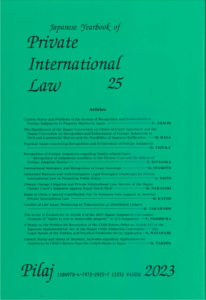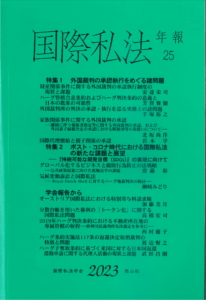25th Volume of the Japanese Yearbook of Private International Law (2023)
The Japanese Yearbook of Private International Law (kokusai shiho nenpo) (hereinafter “JYPIL”) is an annual publication of the Private International Law Association of Japan (kokusai shiho Gakkai) (hereinafter “PILAJ”). The PILAJ was founded in 1949 as an academic organization. Its main objective is to promote the study of private international law and encourage cooperation with similar academic institutions abroad, as well as coordination among private international law scholars. Since its inception, the PILAJ has organized conferences on a semi-annual basis and, since 2012, on an annual basis (see records of recent past conferences here).
Since 1999, PILAJ has been publishing its JYPIL (The contents of all volumes are available here. The contents of volumes 1 (1999) to 19 (2017) are freely available. English abstracts of the papers published in Japanese are also available from volume 18 (2016)). JYPIL is a peer-reviewed journal that presents trends in academic research in the field of private international law in Japan, with high-quality discussion of the most important issues in the field from both Japanese and comparative law perspectives.
Recently, the 25th Volume (2023) of JYPIL has been published. It contains the following papers (abstracts are condensed summaries of the English summary provided by the authors):


- Eiji ADACHI, Current Status and Problems of the System of the Recognition and Enforcement of foreign Judgments in Property Matters in Japan
Abstract: This paper provides an overview of the current status and upcoming challenges in Japan regarding the recognition and enforcement of foreign judgments. It outlines trends, legislative changes, and Supreme Court precedents since 1996, with a focus on judgments involving the United States and China. Despite a trend toward increased recognition, challenges remain, particularly highlighted by the 2019 Hondaya Judgment I, which raised questions about the service of foreign judgments on defendants consistent with Japanese public policy. The paper critiques the Supreme Court’s understanding of procedural ordre public, suggesting that it needs to be reformulated based on insights from European debates to address unnecessary and excessive scrutiny.
- Masaaki HAGA, The Significance of the Hague Convention on Choice of Court Agreement and the Hague Convention on Recognition and Enforcement of Foreign judgments in Civil and Commercial Matters and the Possibility of Japanese Ratification
Abstract: The paper examines the potential benefits for Japan in ratifying the Convention on the Recognition and Enforcement of Foreign Judgments (2019) and the Convention on Choice of Court Agreement (2005). It discusses various aspects of these conventions, such as mutual applicability, jurisdictional issues, recognition of foreign judgments, and reciprocity. The paper suggests positive consideration for ratification, highlighting the importance of enhancing Japan’s role in international civil dispute resolution and ensuring predictability in such cases. It also explores potential solutions to reconcile differences between the conventions and Japanese law through declarations limiting recognition and enforcement.
- Hiroyuki TEZUKA, Practical Issues Concerning Recognition and Enforcement of Foreign Judgments
Abstract: The paper addresses the practical challenges of recognizing and enforcing foreign judgments in Japan, examining issues such as indirect jurisdiction, exclusive choice of court agreements, and conflicts between arbitral tribunals and domestic courts. Part 2 provides practitioner insights into Japan’s potential accession to the Hague Conventions. Part 3 discusses possible legislative reforms to improve the recognition and enforcement process, drawing comparisons with the revised system for arbitral awards in Japan.
- Naohiro KITASAKA, Recognition of Foreign Judgments Regarding Family-Related Cases – Recognition of Judgments Ancillary to the Divorce Case and the Effects of Foreign Adoption Decree
Abstract: This paper discusses amendments to Japan’s Personal Status Litigation Act, distinguishing between the recognition of foreign judgments in personal status litigation and domestic relations cases. In particular, it examines the recognition of ancillary judgments in divorce cases, concluding that they fall under article 118 of the Code of Civil Procedure. The paper also examines the effects of foreign adoption decrees, suggesting that recognition should cover the legal parent-child relationship and the termination of the pre-existing relationship, but not parental responsibility.
- Manabu IWAMOTO, International Surrogacy and Recognition of Legal Parentage
Abstract: The paper discusses the legal complexities of surrogacy, particularly the challenges posed by varying legal recognition in different countries. While Japan does not recognize surrogacy locally, recent developments in Austria and Germany show recognition of children born through surrogacy abroad. The study examines European court decisions, domestic legislation, and international projects aimed at stabilizing the legal status of such children. It suggests that Japan might consider recognizing parentage through foreign decisions. The study emphasizes the importance of international cooperation to protect children and acknowledges differing views on banning surrogacy itself.
- Akira SAITO, Globalised Business and Anti-Corruption Legal Strategies: Challenges for Private International Law in Promoting Public Policy
Abstract: The paper calls for a shift in private international law to address global challenges like the SDGs and ‘Business and Human Rights.’ Proposing a name change to conflicts law studies, the author emphasizes the need for a broader approach. Using the prevention of bribery as an example, the paper underscores challenges in coordinating legal systems and the urgency for interdisciplinary collaboration in private international law studies to meet current demands.
- Midori NARAZAKI, Climate Change Litigation and Private International Law: Review of the Hague District Court’s Judgment against Royal Dutch Shell
Abstract: This paper analyzes a landmark decision by the District Court of The Hague on May 26, 2021, ordering Royal Dutch Shell to reduce its greenhouse gas emissions by 45% by 2030. The decision is the first to recognize a corporate duty to mitigate climate change under tort law. The analysis outlines four key issues: the nature of climate change damages, the attribution of responsibility for policy decisions to the parent company, the application of an unwritten standard of care based on human rights principles, and the consideration of the impact of emission permits on civil law obligations. The paper examines the decision’s significance in private international law and its consistency with climate attribution science.
- Mitsuki KATOH, Right to Claim Special Contribution Fee (a Statutory Care Legacy) in Austrian Private International Law
Abstract: The paper explores Japan’s unique special contribution claims system introduced in 2018 under article 1050 of the Japanese Civil Code. It compares this system to the legal frameworks of other countries, particularly the German Civil Code and Austria’s Pflegevermächtnis introduced in 2015. Both Japan and Austria aim to address challenges associated with an aging population and compensating those providing long-term care for the elderly. The legal nature of Pflegevermächtnis is debated, with scholars questioning whether it falls under inheritance law or unjust enrichment. Understanding these distinctions is essential for interpreting the right to claim special contribution under Japanese private international law.
- Koji TAKAHASHI, Conflict-of-Law Issues Pertaining to Tokenization on Distributed Ledgers
Abstract: This paper discusses the legal aspects of tokenization, focusing on determining the governing law for tokenized rights. It distinguishes between a token-centered and a right-centered approach and argues in favor of the latter. The right-centered approach suggests that issues related to tokenized rights should be determined by the law applicable to the represented right, making consideration of token ownership unnecessary except in specific contexts where the ownership theory is adopted. The paper highlights the importance of this approach in the evolving landscape of crypto-assets and tokenization.
- Yuko NISHIMURA, The Scope of Exclusivity in Article 6 of the 2019 Hague Judgments Convention: Analysis of the “Right in rem” in Immovable Property in ECJ Judgments
Abstract: This paper examines the scope of article 6 of the 2019 Hague Judgments Convention, which will enter into force in September 2023. The Convention, which focuses on indirect jurisdiction for recognition and enforcement, prohibits the circulation of judgments outside the location of the property. The paper analyzes the potential impact in Japan, comparing article 6 with provisions in the Japanese Code of Civil Procedure. It predicts limited impact due to existing CCP provisions, but highlights potential challenges for the circulation of Japanese judgments abroad. Drawing parallels with ECJ rulings on the Brussels Regime, the analysis narrows the interpretation of article 6 and influences Japan’s ratification considerations.
- Satoshi WATANABE, A Study on the Petition for Revocation of the Child Return Order on Article 117 of the Japanese Implementation Act of the Hague Child Abduction Convention – The Legal Nature of the Petition and Practical Guidance for its Application
Abstract: The paper explores article 117 of the Japanese Implementation Act of the Hague Child Abduction Convention, allowing the revocation of child return orders under changed circumstances. Examining two Supreme Court decisions from 2017 and 2020, the analysis covers grounds for revocation, the child’s refusal to return, and discrepancies with EU and Anglo-American Law decisions. It criticizes the domestic focus in Japanese implementation, urging better coordination and information sharing for aligning decisions with international norms.
- Masanori TAKEDA, Current Status and Issues of Attorney Activities regarding Applications for Assistance in Child’s Return from the United States to Japan
Abstract: The paper addresses the challenges faced by attorneys handling child abduction cases from the United States to Japan under the Child Abduction Convention. It emphasizes the importance of utilizing State Department financial assistance and highlights the difficulties of selecting U.S. attorneys with limited budgets. Despite potentially disappointing outcomes, the continued commitment of attorneys and support for petitioners is critical. The paper calls for continued financial support from the Ministry of Foreign Affairs and recognition of such legal efforts as pro bono by Japanese bar associations.
The full English summary of the papers is now available on the PILAJ website here.
The current and past volumes of JYPIL can be ordered from the publisher’s website. (Shinzansha).